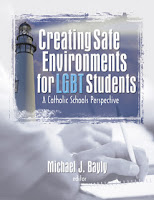
The rector of the Basilica of St. Mary in Minneapolis, Rev. Michael O’Connell, had a topical and informative letter published in today’s Star Tribune. As you’ll see, it concerns the controversial Good Friday prayer for the Jews contained in the Tridentine mass.
A Step Back on Friday
Having received permission by Pope Benedict to return to using a 1962 version of the Roman Catholic liturgy, an extremely small number of ultra-traditionalist Catholics will pray in Latin for the “conversion of the Jews” during the upcoming Good Friday solemn liturgy.
The history of this prayer clearly reflects the attitude of Catholics toward Jews during the past two millennia. In its “Tridentine” version dating back to 1570, it called for the conversion of the “perfidious Jews.” Pope John XXIII struck the offensive adjective from the prayer in 1962. Responding to the theological advancements of the Second Vatican Council (1962-1965), his successor Pope Paul VI removed all references to conversion from the prayer in 1970. This version, which has been used ever since, acknowledges that the Jewish people were “the first to hear the Word of God” and asks that they “may continue to grow in the love of his name and in faithfulness to his covenant” and that they “may arrive at the fullness of redemption.”
John XXIII, Paul VI, as well as John Paul II (the Polish pope who lost friends in the Nazi Holocaust) were keenly aware that more than 6 million Jews were murdered during their own lifetimes. These same popes also knew that 2,000 years of Christian teaching of contempt against Jews didn’t necessarily cause the Holocaust, but clearly enabled it. As a result they made great efforts to encourage reform in church theology about the Jewish people. This culminated in John Paul II asking forgiveness for Catholic teachings and actions that dishonored Jews and caused Jewish persecution during the past 2,000 years. In addition to these popes, many respected Catholic theologians have defended the legitimacy of Jewish faith to stand on its own without Catholics seeking their conversion.
I pray that our Jewish friends will see the progress in Catholic teaching since the Second Vatican Council and understand that our church moves very slowly, sometimes taking a few steps back, but ultimately moving toward the light.
Thank God millions and millions of Catholics [presumably a reference to those Catholics not participating in the Tridentine mass] will pray this Good Friday, not for the conversion of the Jews, but that “they may continue to grow in the love of his name and in faithfulness to his covenant.”
The Rev. Michael J. O’Connell,
Rector, Basilica of St. Mary, Minneapolis
O’Connell’s remarks remind me of theologian Uta Ranke-Heinemann’s examination of the story of the Passion as “a tale full of political bias.”
In her book, Putting Away Childish Things, Ranke-Heineman writes:
The Gospels were able to serve as a welcome support for Hitler’s hatred of the Jews because the Evangelists’ picture of the Jews is negative and distorted. Whatever else it may be, the story of the Passion is a tale full of political bias. It was written to clear Christians of their reputation for hostility to the state. Hence, it flies in the face of the truth by claiming that the Jews were responsible for the whole thing. It was not Pilate, the Romans, but the Jews who killed Jesus. The Jews are the enemies of the Christians, and the Christians are not the enemies of the Romans.
Elsewhere in the book’s chapter on Good Friday, Ranke-Heinemann examines the “Christian canonization” of Pontius Pilate:
While [Jesus’] trial before the Sanhedrin [the Jewish High Council] never took place, [his] trial before Pilate certainly did. But this doesn’t mean that Pilate personally took charge of the case (which was only one of many). None of the Evangelists can erase the fact that the Roman trial actually occurred. But all four Evangelists take pains to whitewash Pontius Pilate as far as possible.
Over the years from 70 to 95, we can watch the process from Mark to Matthew and Luke (the latter two are dependent on Mark), all the way to John, the last of the four Gospels. The bottom line is that Pilate is increasingly excused, while the guilt of the Jews is depicted in ever more glaring colors.
. . . The Christian canonization of Pilate in the New Testament reaches its zenith in the fourth Gospel. While Mark and Matthew report that Jesus gave Pilate no answer . . . in John Pilate and Jesus almost engage in a friendly conversation. In the course of this discussion Jesus explains the nature of his kingdom as the reign of truth, and Pilate raises himself to philosophical heights with the question, “What is truth?” (John 18:38). As a result of this exchange, Pilate says three times that he finds no guilt in Jesus. (John 18:38; 19:4, 6).
John may not be able to cancel the historical fact that Jesus was executed by the Roman procurator, suffering capital punishment in the Roman style, by crucifixion. But he brings a factor into play that is designed to prove that the crucifixion took place entirely against Pilate’s will. According to John, Pilate was blackmailed by the Jews, who threatened his career: “‘If you release this man, you are not Caesar’s friend’; . . . when he heard these words, he brought Jesus out” (John 19:12-13). What John wants to say is that, practically speaking, Jesus was crucified “under” Pontius Pilate, but not by him. “Under Pontius Pilate,” as if merely citing a date, is the Nicene creed’s way of downplaying Pilate’s importance. But Pilate had Jesus executed, in the Roman, not the Jewish, fashion.
In this respect Tacitus is an unbiased reporter when he correctly says, “Christus Tiberio imperitante per procuratorem Pontium Pilatum supplico adfectus erat” (Christ . . . had undergone the death penalty in the reign of Tiberius, by sentence of the procurator Pontius Pilate [Annals XV, xliv; LCL, p. 283]).
Thus the Christian judgment of Pilate grew more and more favorable from Gospel to Gospel. Bad as the development of the legend of Pilate has been for the Jews, Pilate later came off very well with the Christians. In the period after the New Testament, he continued his Christian career. Pious apocryphal writings were composed in his name, for example, a letter to Emperor Claudius and a correspondence with Herod. His wife acquired even greater prestige, since in Matthew’s Gospel she had sent word to him, “Have nothing to do with that righteous man, for I have suffered much over him today in a dream” (Matt. 27:19). Origen (d. 253) says that she converted to Christianity (Comm. In Matth., n. 122). In the so-called Paradosis, the “tradition” of Pilate (5th century), which describes how Pilate, too, came to believe in Christ and was beheaded for his faith by order of the emperor, we even learn her name: Prokla in Greek, Procula in Latin (cf. Chapter Fourteen, “The Apocrypha”). And, to bring this tale to a happy ending, both Pilate and his wife were honored as saints (on 19 or 25 June) in the Ethiopian calendar (Heinrich Joseph Wetzer and Benedikt Welte, Kirchenlexikon, X, 4).
The Gospels’ story of Pilate proclaims no “good news”; it sows the seed of hatred. Almost two thousand years after the fact, people can still quote the Jews as saying that their persecution by Christians and their annihilation in the gas chambers was a fate they deserved. That such a statement is even possible shows the maliciousness of a bias (evident back in New Testament times) that claims to be representing the cause of Christ but that constitutes its perversion: The calumny against the Jews in the New Testament became the Christian legal title to their persecution and destruction.
In Faith and Fratricide: The Theological Roots of Anti-Semitism (1974), the American theologian, Rosemary Radford Ruether, correctly points out that these anti-Jewish trends were not an accidental excess of later Christian generations. They did not derive from later developments; they were present in the Gospels from the very beginning.
– Excerpted from Putting Away Childish Things: The Virgin Birth, the Empty Tomb, and Other Fairy Tales You Don’t Need to Believe to Have a Living Faith by Uta Ranke-Heinemann (translated by Peter Heinegg), (English translation: New York: HarperCollins,1994).
Image: Ecce Homo (“Behold the Man!”) by Antonio Ciseri.
Recommended Off-site Links:
Pope Benedict to Reformulate Good Friday Prayers for Tridentine Mass – Catholic News Agency, February 5, 2008.
Pope’s Prayer Change Disappoints Jews, Some Traditionalist Catholics – FaithWorld (Reuters), February 6, 2008.
Praying for the Jews: Two Views on the New Good Friday Prayer – John T. Pawlikowski and Judith Banki (Commonweal, March 14, 2008).
Restorationist Skulduggery by Joseph O’Leary.
See also the previous Wild Reed posts:
Revisiting a Groovy Jesus (and a Dysfunctional Theology)
Palm Sunday: “A Planned Political Demonstration”






















2 comments:
The exegesis on the passion of Christ leaves no doubt that Pilate seems more and more interested in freeing the prisoner, Jesus.
Yet, in my view that makes him all the more guilty. The fact is that the gospel of John makes him look convinced of Jesus' innocence, but he condemns him anyway! At least in the synoptics Pilate could be said to be invincibly ignorant. To me the culpability is all the more lamentable because he did know Christ to be innocent but condemned him anyway!
I wonder when the Church will apologize for persecuting gays through the centuries. JPII certainly went out of his way to pardon Galileo, beg the Jews for forgiveness, and just about every other group...funny...gays were never included. Hmmmm.....
"Putting away childish things" seems to me to demand we put away superstition, magical thinking, fantastic illusions, and other childish beliefs. I enjoy Aesop's Fables, Greek Drama, and television/film, but I know these are stories, not facts, much less true.
Besides our sexuality, the only significant demarcation between childhood and an adult is reasoning. Saint Paul even urges, "Do not despise the words of prophets, but test everything; hold fast to what is good; abstain from every form of evil."
How can one test the unknowable? How can one know the good that is unknowable? Taking his word for it? Well, if so, women must earn their salvation silently through childbearing, and homophiles are already condemned and "given up" by God to their debased thinking, as "evidence" of their sin of idolatry.
I think a critical test of those claims leaves much to be desired, but I don't make the rules. Who does? The believer-god who trumps the god of revelation selectively? Pat Robertson or Benedict XVI? They all seem to agree with Saint Paul. Unless one can contradict oneself, one cannot have it both ways.
Post a Comment